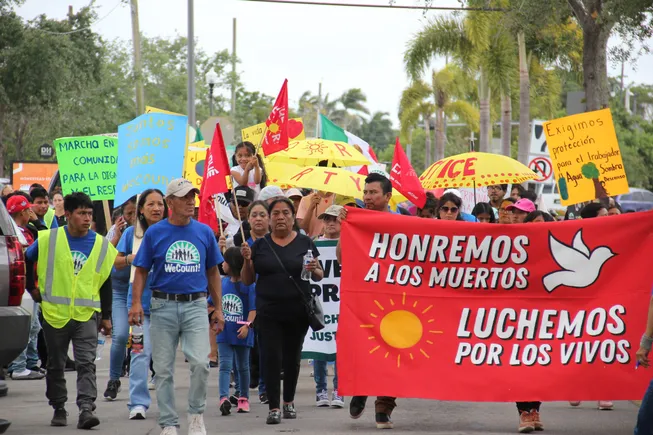This is the second in a series of three articles examining the dangers of extreme heat in construction and how contractors plan to keep workers safe this summer. Click here for the first story.
It was a hot day in Florida and Javier Torres was working in the sun. He began to feel “dizzy and cloudy” when he collapsed.
He fell from a ladder, dropping two stories to the ground below.
“They said I almost broke my back,” Torres told Construction Dive, communicating in Spanish through a translator. “I felt pain for more than a month, but had to get back to work to provide for myself.”
A Colombian immigrant who does residential roofing, painting and demolition work in the Miami area, Torres said he has been repeatedly denied the chance to take breaks to drink water or rest in the shade while working. He declined to share the name of his employer.
Torres and other members of Miami-area worker nonprofit WeCount! perform physically demanding jobs in intense heat and say their employers often deny them the protections they need to carry out their work safely. They believe they’re treated this way in part due to their ethnic background.
Heat safety background
WeCount! has held rallies against a Florida law — House Bill 433, signed by Gov. Ron DeSantis this spring — that will go into effect in July, which prevents cities and counties in the state from enacting laws requiring water breaks not mandated by the federal government.
Under federal regulation, employers must provide workers with a workplace free from identifiable hazards. According to OSHA, that includes heat illness. Many construction employers go above and beyond what the agency expects of them, using OSHA standards as a baseline.
But in the absence of specific federal rules around how to protect workers from heat, states like Florida have stopped local municipalities from enacting their own mandates to require water breaks.
The ramifications of those laws taking effect couldn’t be more clear to Torres.
“I’ve also lost two coworkers who died of extreme heat,” Torres said.
His coworkers’ deaths aren’t isolated cases. In 2021, 36 workers died on the job from heat exposure in the U.S. according to the most recent data from the available Bureau of Labor Statistics. That doesn’t include nonfatal heat illness injuries, which can still have serious health impacts, such as in Torres’ case.
Torres is not the only one with a story.
No time for breaks
The residential construction workers who spoke to Construction Dive said toiling under the hot sun is intense. They feel the physiological effects of heat and hydration, as their strength saps quickly.
“When you work only three hours in with no breaks, you begin to feel headaches, muscular cramps, it begins to impact your body,” said Pedro Marcos, another construction worker and WeCount! member communicating through a translator. “There’s no time to drink water or take breaks. In my job, your body begins to heat up. You feel dizzy. You’re around metals and materials on the roof that also give off heat.”
Javier Torres speaks at a WeCount! event for Workers Memorial Day.
Permission granted by WeCount!
And speaking up doesn’t always work, said Donato, a Guatemalan immigrant who requested anonymity to avoid retaliation from his employer. Companies use workers’ ethnic backgrounds against them, Donato said, speaking through a translator.
“Whenever we speak up as workers, the first thing that we’re told by our employers is to ‘go home.’ That if we don’t like the conditions in our workplace, we can leave and just lose our jobs,” he said. “But we have families that we have to take care of. We have bills we have to pay. Our rent also needs to get paid. So we keep working for ourselves and for our families.”
Marcos said when he and his coworkers do request and receive water from employers, it is sometimes in dirty, moldy coolers.
All three of the WeCount! members who spoke to Construction Dive said they think they would be treated differently if they were not immigrants, but they also know the value of their labor.
“Maybe some of them see our color or immigration status and that’s why they mistreat us, but we know that we deserve respect and dignity. Without us, the workers, there is no work,” Donato said.
Advocating for change
WeCount! runs the ¡Qué Calor! campaign focused on raising awareness and advocating for legal changes for protecting outdoor workers in intense heat, especially as the implementation of House Bill 433 looms.
WeCount! and other groups such as the American Civil Liberties Union in Florida want basic, codified protections to avoid heat illnesses.
“We also think it’s important to educate workers so they can prevent these things from happening so that we can all stay safe and return home to our families after the end of the workday,” Torres said.
Marcos said WeCount! seeks to recruit more workers to the organization to help them organize, calling immigrant workers “the motor of the economy.”
And Donato kept it simple, demanding protection for the very thing already recommended and practiced by so many.
“All we’re asking for is water, shade and rest,” he said. “It’s not complicated.”
>>> Read full article>>>
Copyright for syndicated content belongs to the linked Source : ConstructionDive – https://www.constructiondive.com/news/florida-construction-workers-say-theyre-denied-water-rest-shade/717487/
